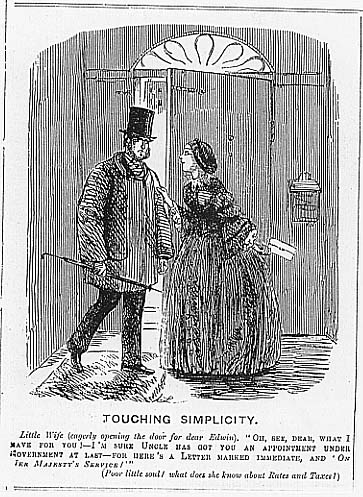
Punch XXX (April 26, 1856): 170

 ictorian women make it onto the pages of Punch in a limited
number of situations and circumstances. They are portrayed in
the home, where the words and actions of children are often the
center of the scene; their frivolous addiction to fashion is
mocked by exaggeration (we see the comic inconvenience of hats
the size of umbrellas and crinolines as wide as the street); and
the stereotype of the nagging, shrewish, harpy of a wife is often
depicted, a nightmare vision of domesticity gone awry. In
"Touching Simplicity," the comic point centers on the lesser
intelligence of the 'little wife' who happily awaits her
husband's arrival waving an official envelope, which she believes
to be news of a government appointment for him. Unfortunately,
she is too dimwitted and unworldly to recognize that the envelope
signals bad news, in the form of annual taxes. Edwin's attitude,
and the caption beneath, regard her with kindly bemusement,
chuckling wryly at her naive and misguided ineptitude.
ictorian women make it onto the pages of Punch in a limited
number of situations and circumstances. They are portrayed in
the home, where the words and actions of children are often the
center of the scene; their frivolous addiction to fashion is
mocked by exaggeration (we see the comic inconvenience of hats
the size of umbrellas and crinolines as wide as the street); and
the stereotype of the nagging, shrewish, harpy of a wife is often
depicted, a nightmare vision of domesticity gone awry. In
"Touching Simplicity," the comic point centers on the lesser
intelligence of the 'little wife' who happily awaits her
husband's arrival waving an official envelope, which she believes
to be news of a government appointment for him. Unfortunately,
she is too dimwitted and unworldly to recognize that the envelope
signals bad news, in the form of annual taxes. Edwin's attitude,
and the caption beneath, regard her with kindly bemusement,
chuckling wryly at her naive and misguided ineptitude.The cartoon demonstrates the common Victorian conception, based in medical and cultural 'fact,' of women as beings with a lesser mental capacity. Since the 1820s, the English scientific community, led by craniologists and anthropologists, touted physical proof of the smaller size of the female brain in comparison to the male. The medical theory cemented the social perception, disseminated through popular literature and images, of women as the 'weaker vessel,' the gentler sex crafted for childbearing and incapable of the higher thought required in the public life -- political, economic, and social -- of men. The wife's "touching simplicity" is indeed that of a child; her innocent face and guileless manner exemplify the how deeply the Spencerian theory of arrested development permeated Victorian cultural beliefs. Women were perceived, like the African natives or the wild Irish, as victims of a stunted mental and emotional growth that prohibited fully mature development. The strengths of the sex were the baser, more animal capabilities outlined in Darwin's Descent of Man in 1871: imitation, rapid perception and intuition (as opposed to creative innovation, close observation and rationalization).
These broad understandings of the female nature dictated women's position in the legal sphere as well. Under English Common Law, women forfeited all legal power over themselves and their property when married; the doctrine of the feme covert placed wives under the legal and financial representation of their husbands, and consequently prohibited women from entering into any binding contracts or obligations. Essentially second-class citizens in the eyes of the law, it is no surprise then that women like the 'Little Wife' pictured above were ignorant of the ways and means of the business world: legally, socially, and politically, they were excluded from the public world populated by men.
Click here for "A Case for Sir Richard"
[Victorian initial "V" by Harlan Wallach ©copyright 1994.]